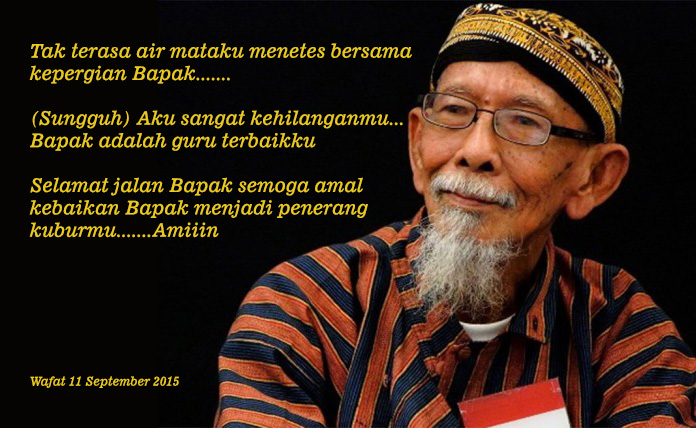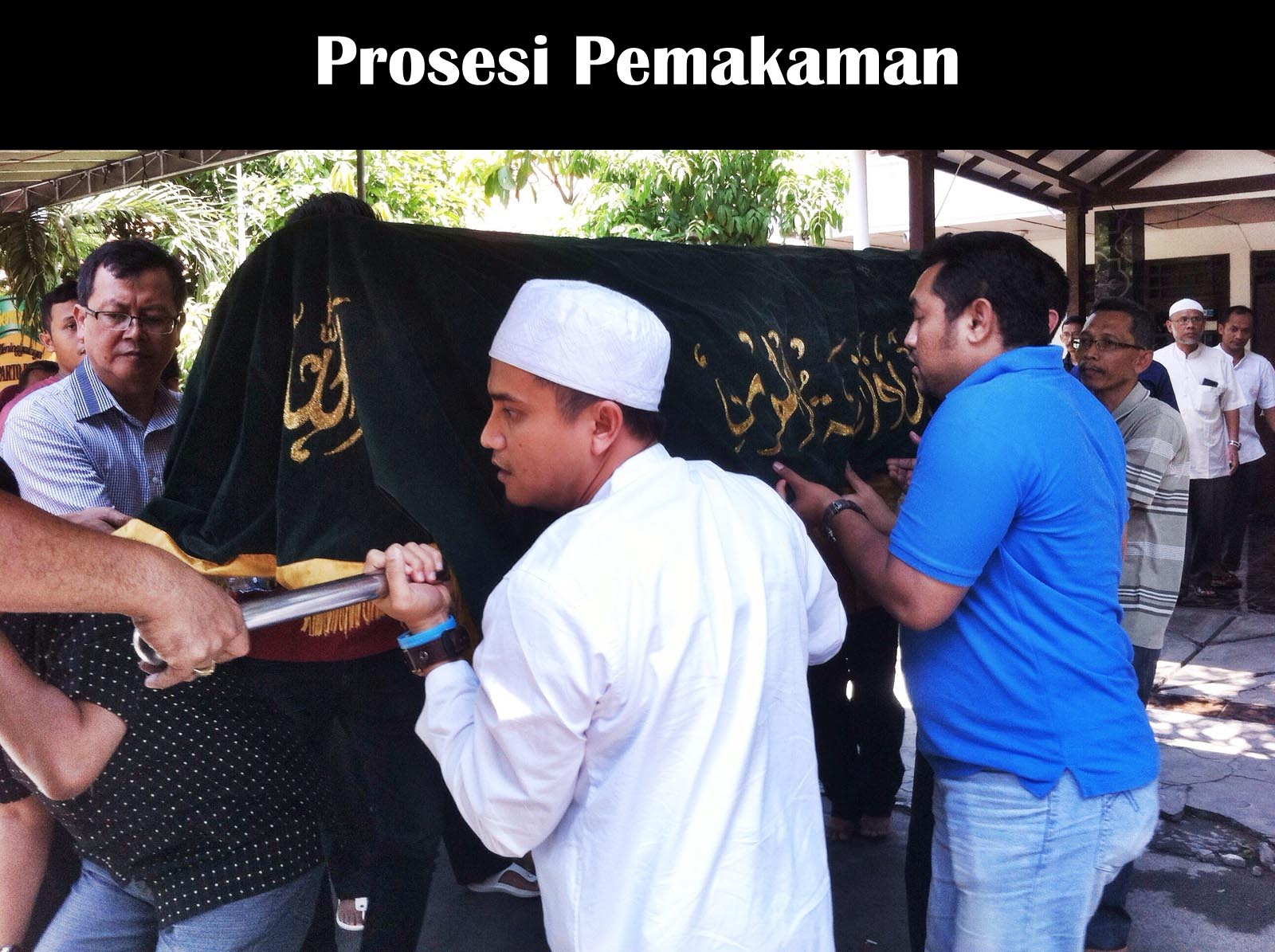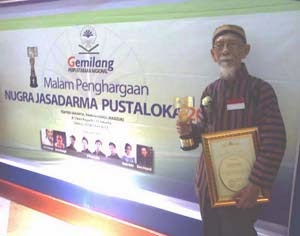The S.E.A Write Awards
THE HEAD OF THE NATIONAL
LANGUAGE
CENTERMINISTRY OF NATIONAL EDUCATIONTHE
REPUBLIC OF
INDONESIA
Since 1979 The S.E.A Write Awards has been given to profile writers in South East Asian countries. In relation in this,
National Language Center, Ministry of National Education, every year sets up a comimittee for selection of Indonesian literary writers for the corresponding year. One of them is pointed to represent Indonesian writers to receive The S.E.A Write Awards from the
Kingdom of
Thailand.For year of 2007
Indonesia has chosen Suparto Brata as the recipient of the award. In this connection, the
National Language Center has published the booklet Indonesian Writer; Awardee of the S.E.A. Write Award 2007, for the presentation of the award in
Bangkok, Thailand.Finally, I would like to express my sincere thanks to those who enabled this booklet to be published.
Jakarta, September 2007.Dr. Dendy Sugono
ACCEPTANCE SPEECH OFTHE S.E.A. WRITE AWARD 2007
Your Excellency,Crown Prince of
Thailand,Prince Maha Vajiralongkorn,Ministers,Ambassadors,Committee of SEA Write Award,Ladies and Gentlemen.
I have written since 1950. At that time I wrote due to earn a living, and writing became my choice. As a matter of fact, my writings were always turned down by editorial staffs. And not until 1952 one of my writings appeared on a newspaper. Furthermore I lived not by writing was instead I earned for a living through various kinds of job. However, writing was inescapable from my living activities throughout my life, although I had not resulted in realiable compositions to earn for a living. So far I have composed 125 book titles, none of them was reprinted, not translated to foreign languages. It indicates that quality of my compositions is poor. Taking it into account, until I am old, I have never won prime prizes at national (Indonesia) level in the writing field. Being aware of it, up to now being healthy and capable, I keep on writing works as an act of devotions, mandate and blessing.It is very touching, cheering up and surprising, when I have been in my twilight age and adhered to philosophy of acepting the real facts, that writing activity is an act of devotions, mandate and blessing, I was informed that I won The S.E.A. Write Award. Really, it is miraculous. In my own country, I have never reached “national name”, now I am awarded as an author at the level of “south east Asia”.Herewith I would like to extend my deepest gratitude to executive committee of The S.E.A. Write Awards of 2007, as well as jurors that have selected me as The 2007 Man of Letters and honored to get the prize. My family and I are really proud of the prize. Perhaps it is not enough just to be proud of it, but I must be responsible to maintain and improve my authorship, both facets of quality and my activities, hence of The S.E.A. Warite Awards of 2007 did not mistakenly select me recipient of The S.E.A. Write Awards of 2007. Though I felt miraculous, I am sure that the prize not just comes out of the blue. Jurors selected me this year, of course, with judicious reasons, even though not the quality of my works; instead the quality of my activities that became consideration, namely my axertion in writing struggles. Even though my writings often ended up in failures, yet I did not want to lose. Despite at the beginning I wrote to earn a living, and then unsuccessful to be my main livelihood, yet I have made writing as my living activity foundation for the rest of my life. Anyhow, Literature Prize of the S.E.A. Write Awards of 2007 is not just a coincidence, yet in terms of my activities to carry out acts of devotions, mandate, and blessing.Thank you.
Surabaya, 27th of June, 2007.Suparto Brata.
BIOGRAPHY
Suparto Brata was born in Surabaya, 27th of February 1932. His mother belonged to nobility of Surakarta Hadiningrat, thusly Suparto Brata got a nobility title of Raden Mas (R.M.). Yet except her nobility blood, his mother did not have any heritage from her ancestors, and did not have occupational skills. His father was not a noble man, even though his ancestors also originated from Surakarta Hadiningrat, yet he preferred to bringing his family to earn for a living outside of Surakarta Hadiningrat Kingdom, namely in East Java (territory of Dutch Dominion). For years the couple lived in East Java, changed jobs repeatedly, moved to other towns, and gave birth until seven times, yet only the 4th child survived, so the fourth child was raised, schooled, and put into dormitory at catholic school in Malang, separated from his parents. The person who financed his school and dormitory was a nephew that felt owing kindness to the couple. Obviously, a child in the dormitory was not financed by his father.Suparto Brata was born as the 8th child of the couple. When Suparto was born, his father did not have a job (malaise period) and did not have a permanent residence; so his mother opted to take the 6 month-old Suparto to Surakarta Hadiningrat, stayed with her uncle. Her (Suparto’s mother’s) uncle was a prince, his house was large like a palace, and his lifestyle was very closely related to Javanese palace nobility of Surakarta Hadiningrat. Suparto Brata stayed at the palace until he was 6 years old.And therewith Suparto Brata never lived together with his father.Suparto since his childhood to adolenscence always followed his mother wherever she went to earn for a living, namely strove to do various jobs such as selling cooked rice, depended on someone else or became a domestic servant for her rich relatives, moved from one relative to another, different towns. Also due to World War II moving from one job and residence to other ones that she (Suparto’s mother) had to do it, looked for a safe life.Because of war, Suparto followed his mother moved to other places: Solo, Sragen, Surabaya, Probolinggo and Surabaya again. Her mother livelihood was just being a servant of her rich family. Finally, in Probolinggo in refuge due to Surabaya was occupied by English troops (1945-1947), Suparto and his mother stayed with his elder brother (the 4th Suparto’s elder brother, that stayed at a dormitory in Malang. He was 10 years older than Suparto). His elder brother earned for a living, their mother took care of the household, Suparto give some assistence, and went to school. After Probolinggo was invaded by Dutch soldiers, the small family moved in Surabaya, accupted an empty house that belonged to a family who was evacuating.Suparto’ schooling was recurrently stagnated because of the war. In 1950 he was 18 years old, yet he would have just graduated from Lower Secondary School. Six months before the granduation, his elder brother was schooled by the company he worked for (Phillips) to Eindhoven (Holland), and did not give basic nesessities of life again to his mother and younger brother (Suparto). Her mother moved back to Surakarta, stayed at her ancestor noble family. Suparto did not want to follow his mother, particularly he wanted to graduate from Lower Secondary School. Due to he had none to assume liability for his livelihood, Suparto had to earn for a living by himself. At the time he tried to write compostions, yet his compositions were always returned by publishing editorial staffs, improper to be contained in a publication. Suparto livelihood was obtained by delivering newspapers of Djawa Post. He graduated from Lower Secondary School in 1950, due to he did not know his birthday in Christian calender, his mother could just memorize Javanese day-month-year, hence he made it up by himself and determined his birthday was 16th October of 1932, written on his school certificate, and furthermore on his identity card for life. And thereupon after having graduated from Lower Secondary School, Suparto earned for a living by himself by working in various jobs, namely in Telegraph Office (1952-1960), in Government Commerce Office of Djaya Bhakti (1960-1967), buying and selling kapok (1967-1969) as well as a freelance journalist and free author untied by any institute (1968-1988), being a public servant of Surabaya City Administration (1971-1988, retired).In 1952, when he worked in Telegraph Office, his compositions appeared on newspapers. And since at the time, up to now he has never quitted writing. Since a long time ago he has written about anything, free that’s untied by any particular institute or publisher, not dependent on kinds of writing, themes, Suparto writes news/articles/photos/fictions. The fictions take form of short stories, and novels, that up to now he has kept on doing it, and published to be books.In the beginning (1950) Suparto wrote in Indonesian language. In 1958 he won writing a serial story in magazine of Panjebar Semangat (in Javanese Language), and since then his compositions in Javanese languages appeared repeatedly. In 2007, out of 125 titles of his books, 45 titles of them are in Javanese language. For his writing activities and his books that published in Javanese language, he was awarded Prize of Rancagé 3 (three) times, namely year 2000 as Builder of Javanese Language and Literature; year 2001 for his book Trem/Streetcar (collection of short stories) which is considered to be best of all publications of Javanese books at the previous year (2000); year 2005 his book Donyane Wong Culika/State of the Deceitful People (novel) also considered to be best at the previous language, so he was also often called as a fighter of preservation and development of resurrection of Javanese Literature (ethnic local language). Yet his Indonesian books keeps on being published as well.Suparto Brata wrote news, features, reviews, articles and fiction stories since 1952, contained in publications of all kinds of magazine, namely as Majalah Siasat, Mimbar Indonesia, Indonesia, Kisah, Seni, Buku Kita, Sastra, Aneka, Vista, Sarinah, Kartini, Putri Indonesia, and others, as well as in Newspapers of Surabaya Post, Harian Umum, Suara Rakyat, Pikiran Rakjat, Trompet Masyarakat, Jawa Pos, Sinar Harapan, Indonesia Raya, Kompas, Suara Karya, Republika. Almost all of them that have ever been contained in magazines/newspapers have been well clipped.Writing Javanese language since 1958 contained in Panjebar Semangat, Mekar Sari, Jaya Baya, Djaka Lodang, Jawa Anyar, Dharma Nyata.Writing short stories, novels, drama, manuscript of electronic cinema, history books, in Javanese and Indonesia Languages.Several writings were cooperatively done and by means of research, among others are treatise/processes of Surabaya Anniversary, jointly with marine colonel Doctor Sugiyarto, financed by Surabaya Municipal Administration, 1975; The Battle of Surabaya on 10th November 1945, jointly with Drs. Aminuddin Kasdi, Drs. Soedjito (the team was initiated and financed by Team of heroism value preservation of 10th November 1945 in Surabaya, 1986, chaired by Blegoh Sumarto, the chairman of East Java Provincial Representative Assembly); History of East-Java Press, jointly with Drs. Mochtar, Drs. Anshary Thoyib, Soemijatno, Drs. Issatriadi, initiated and financed by Newspaper Publisher Association (SPS) of East Java, 1987; History of Brawijaya Commanders (1945-1990) jointly with Drs. Nurinhwa, Drs. Wawan Setiawan, Dr. Wuri Sudjatmiko, initiated and financed by The Indonesian Academy of Sciences of Jakarta and Brawijaya Regional Military Command, 1988.Name of Suparto Brata has been recorded in the book of Five Thousand Personalities of the World, Sixth Edition, 1998, published by The American Biographical Institue, Inc., 5126 Bur Oak Circle. P.O.Box 31226, Raleigh, North Carolina 27622 USA, with text as follows:BRATA, Suparto, oc/writer, ad/Jl. Rungkut Asri III/12 RL-I-C 17 Surabaya 60293 Indonesia, Public Servant, 1971-1988, Freelance Journalist, 1967-1972, Teleprinter Operator Government Commerce Office, PDN Djaya Bahkti 1960-1967, Government Telegraph Office 1952-1960, cw/Author, Eyes Witness, 1995; No Other Rice, 1958; co-autor of The History of Brawijaya Division Commanders, 1988; The History of Press in East Java, 1987; The Battle of Surabaya on November 1945, 1986. Hon/numerous Awards for Publications.




































